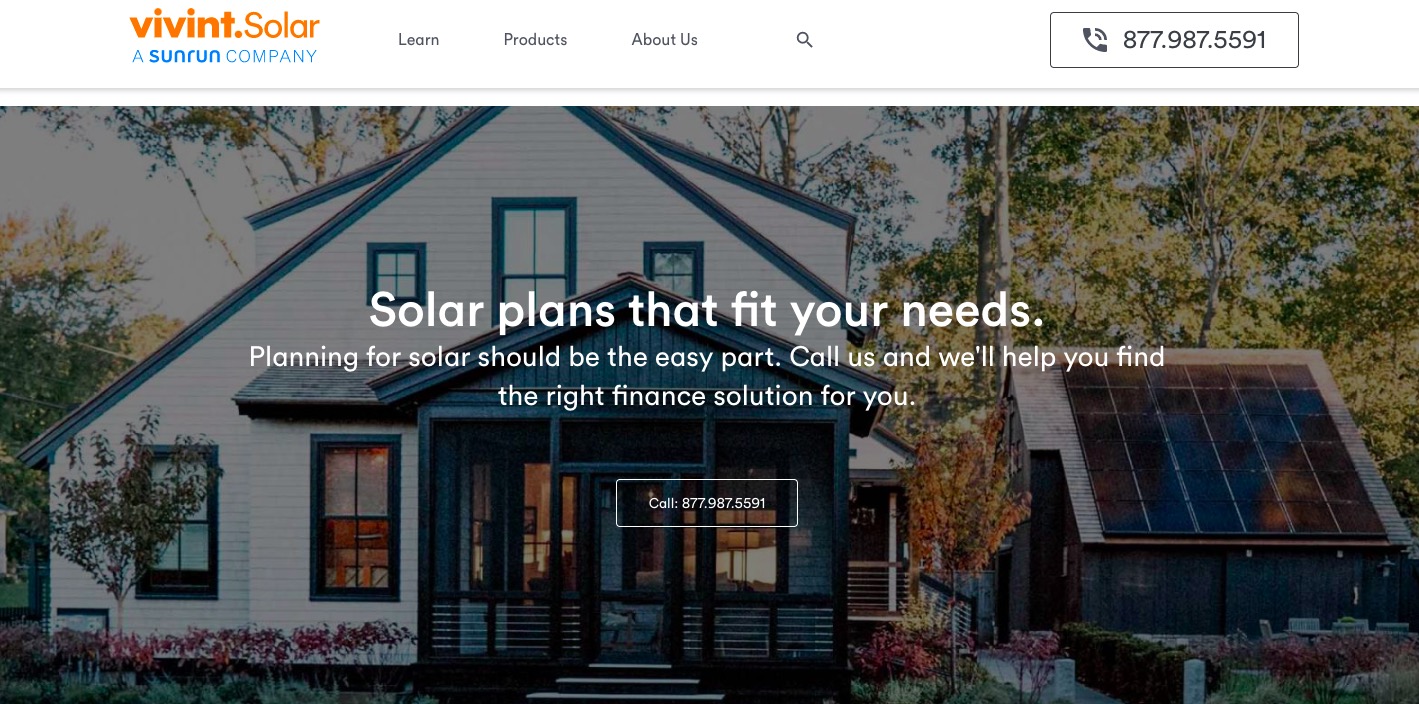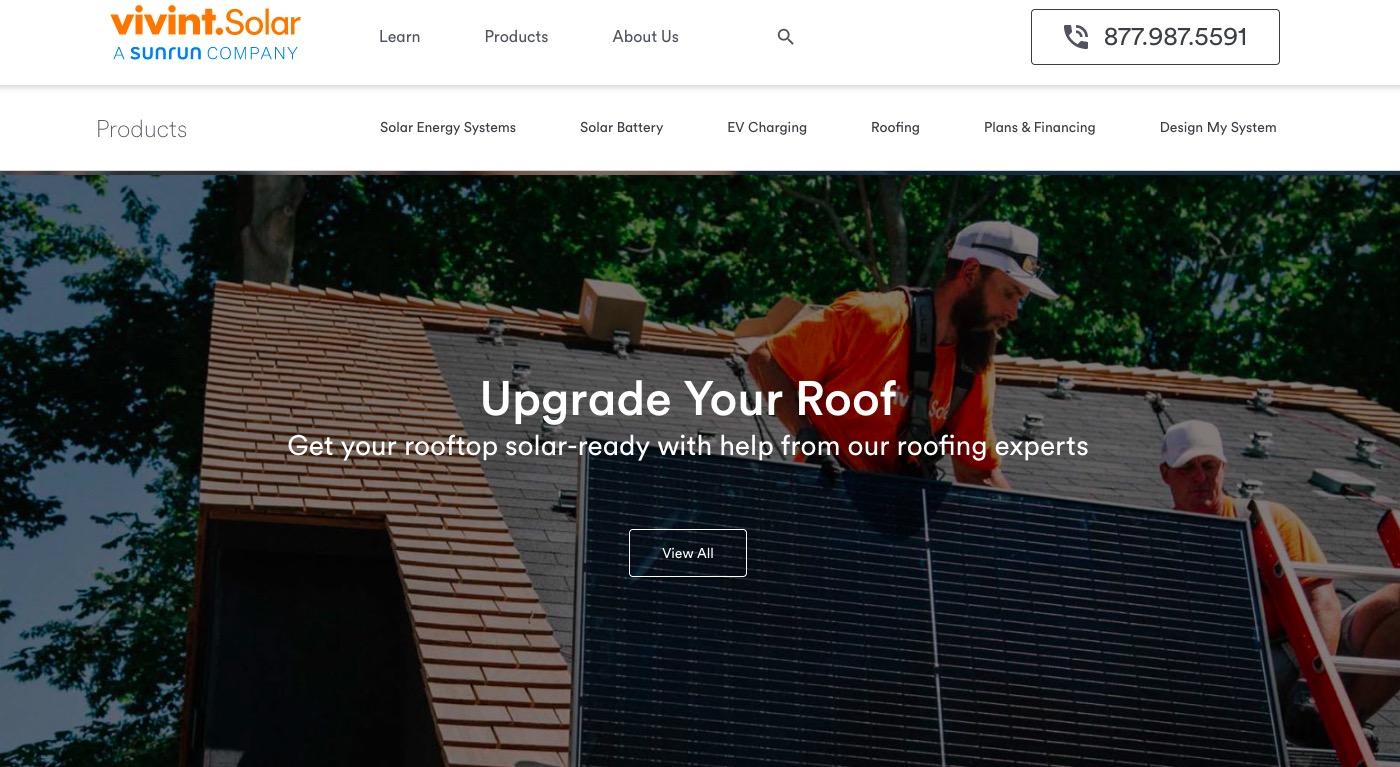Vivint Solar is an American solar energy company, founded fairly recently, in 2011, and headquartered in the state of Utah. It focuses primarily on solar energy for houses and residential buildings, and its main activity is designing, installing, and maintaining photovoltaic systems and panels. The company was born as an incorporation to the home automation company Vivint, and after roughly a year, it became a separate, albeit related, company. In recent times, more specifically in the summer of 2020, Vivint Solar was acquired by the bigger solar panels provider Sunrun. Together, the two companies now serve 495,000+ homeowners nationwide.
Vivint Solar bases its profits on a system of loans, which we will explain more thoughtfully in our review. Simply put, customers don’t buy solar panels; they rent them through a long-term contract, a PPA (Power Purchase Agreement). This business model fueled some controversy, to the time of writing not substantiated.
Overall Ratings
- Quality: 8
- Performance: 7.6
- Warranty and tech support today: 7.4
- Warranty and tech support long-term: 8.2
- Price: 7
- Value for money: 7.9
Pros and Cons

Manufacturing Locations
Vivint Solar is based in Lehi, Utah, and serves and operates in 23 US states, including California, Florida, New Mexico, Texas, and Hawaii. With most of the company’s growth in the early years coming from door-to-door sales, as of March 2020, Vivint installed more than 190,000 solar panels for a total of about 1290 MW.
Since fusing with Sunrun, Vivint expanded its range and began serving a few more areas in the country while at the same time working to improve the service offered and customers’ satisfaction by selling higher quality products and a wider range of them.
What Makes Vivint Panels Unique?
As you have briefly explained above, Vivint Solar’s business model is quite unique and definitely peculiar for a solar panels manufacturer. To be more complete, customers are able to obtain solar power for their houses through three or four means. They can have a loan, purchase or lease a system or panel, or alternatively purchase energy using a PPA (Power Purchase Agreement).
In the first two cases, Vivint’s customer will become the legitimate owner of the solar panel after having paid for the installation or secured financing. Regarding specifically the lease, the customer will pay a Vivint monthly cost, which is based on fixed calculations and expected solar power usage. In the third case, the person doesn’t actually own the solar energy system but simply pays a fee per watt produced by it (kW/h).
Different Types Of Solar Panels Vivint Solar Offers
Vivint does not work only on solar panels. They also offer a vast array of different products, from solar energy systems to solar batteries, electric vehicle charging, roofing, and more. Because the company focuses on selling or renting these products, and not on manufacturing them, the only information we can give you is about the general types of solar panels you will be able to get from Vivint Solar, as much about the details will depend on you.
First of all, we have to distinguish between two very broad and general types of solar panels: thermal and photovoltaic (PV). The first panels work by acting like a mirror and redirecting the sunlight to generate heat. They are very uncommon, and it would be unusual to see them on the roof of some houses in a city. The vast majority of people go instead for the photovoltaic panel, which on the contrary, uses the sunlight to convert it into electricity and power your home.
The Materials Used in PV
If we are speaking of PV, then we have to make a further distinction, which rotates around the materials and the way these panels are designed and built. We are referring to monocrystalline and polycrystalline, both made from silicone, a great element greatly used in the field of solar power because it can easily help in the panel’s function of conversion. Let’s see both these panel subtypes in greater detail.
- Monocrystalline is widely considered as the more efficient, and thus the ones used the most in production. We don’t want to get too technical about these things, but it’s actually pretty simple: the crystalline seed is added to melted silicone to form bars, which are subsequently cut to form wafers. These wafers are precisely what form the basic unit of a solar panel.
Monocrystalline panels vary, even if slightly, not only in color but also in form. A simple way to understand the difference is to remember that the darker something is, the better it absorbs heat. Therefore, dark blue panels will not be as efficient as black ones at absorbing sunlight and thus at producing energy.
- If crystals in the previous case were of the same quality and consistency, this is not the case when it comes to polycrystalline (hence its name). We will spare you the details, but generally, the process to produce polycrystalline solar panels is shorter, albeit very similar to the previous one.
The reason why these panels are not as common comes from the way they have minor structural issues, like the overlapping of crystals and the formation of gaps. For things like these, panels made with polycrystalline are cheaper. Nonetheless, quality can still be quite high regardless of the material used.
Solar Panels and Contract Cost
Now we come to the section in which we analyze current Vivint prices. We have seen how there are in total four ways you can get a solar panel through the company. Let’s see how much is Vivint price in each of these cases.
- Solar purchase. The more traditional option, you buy the solar panel of your choice from Vivint and immediately become its owner. You obtain the product’s warranty and benefits from tax credits and incentives.
- Solar PPA. In such a case, you choose to leave the ownership of the solar panel to Vivint while you pay a monthly rent to the company. There is no upfront cost, and maintenance is included, as well as a warranty.
- Solar Loan. The option allows you to finance your panel purchase with a monthly payment to the financing partner. This way, you are the owner of the system but will have to pay a loan monthly.
- Solar Lease. Finally, the last possibility Vivint offers its customers is to lease for no money down and get a solar panel or system at a reliable monthly rate. The panel’s ownership stays with the company, but maintenance is included in the price you pay.
If you already have one of the plans we detailed above but are wondering how to get out of Vivint Solar contract, no need to panic. The company has good customer support that will take care of your needs and requirements and will assist you in ending the contract with them. You can visit their website at vivintsolar.com to get more information on how to reach out to them, or directly call them using the number you find on the front page.

Standard Vivint Price
Generally speaking, Vivint cost when it comes to panels has been reported at around $3.56 per watt. The price is quite high, especially when we compare it to the average one which sits at about $2.50. The reason for such a price might also come from the higher Vivint equipment cost, as well as the installation one, which went up over the previous years. According to other independent studies, however, panels’ prices for large companies like Vivint Solar as well as smaller ones is around $3 and $4, thus placing Vivint in a standard position.
All Types of Warranties
Vivint Solar offers a standard, average 10-year workmanship warranty aimed at protecting you from any damage that might have been caused by panel installers, like damage to the roof or structural issues. Vivint definitely does better than some competitors who set workmanship warranty as low as a couple of years, but there are other solar panel companies that offer up to 25 years, so there is certainly room for improvement.
Moving on to the solar panel itself, a basic warranty will cover the damage it may go through due to the pass of time or product inefficiencies for 25 years. On top of that, another 10 years of warranty are guaranteed to cover the inverter and the potential issues related to it. As other Vivint Solar reviews have pointed out, the company does quite decently with regard to panel warranties, which all in all provide security and much more tranquility to the buyer.
Are Vivint Solar Panels Right for You?
The business model Vivint pushes through is definitely not something recommended to everyone. It has its great advantages, but the mixed customer reviews show that a lot depends on the salesperson. As we have seen, much of Vivient’s profit comes from door-to-door sales, and having an educated and knowledgeable person in charge of panel sales will greatly make the consumers’ experience better.
You, consumers, have to be well informed as well. We suggest you study and research this system a bit: apart from our article, there are tons of Vivint Solar reviews for you to get an idea of what you can expect. Make sure you draw comparisons between similar companies that offer similar services, as often fares and customers’ satisfaction differ, even great at times. Speaking of fares, the cost is another aspect you have to focus on. We advise you to look at several different options to have a better understanding of prices as you don’t want to be fooled.
You can understand better how the company works by visiting their website or contacting them directly through customer support via email or phone call with an expert. On the webpage, you also find a quick form you can fill out to receive a free quote and find out if your house is a good fit for solar.
Final Advice
In conclusion, it is fair to say Vivint Solar offers an interesting alternative to those who want to get their hands on good solar panels. The way they sell or rent out their products might seem unconventional at first, but it is actually a pretty well-known practice in the United States. Our final advice is to understand what you are getting yourself into: there have been dissatisfied customers and even legal lawsuits against the company, and we don’t want you to be one of those people.
If you acquire enough information and believe Vivint Solar is the perfect opportunity for you, then go ahead with no doubts: certainly, you will enjoy a quality product which will perfectly power your entire house and reduce your energy bill, with the tranquility of a good warranty.